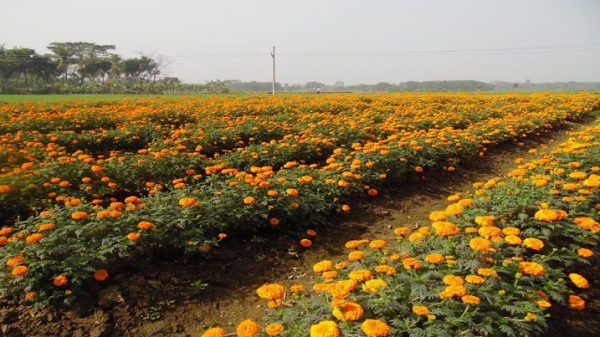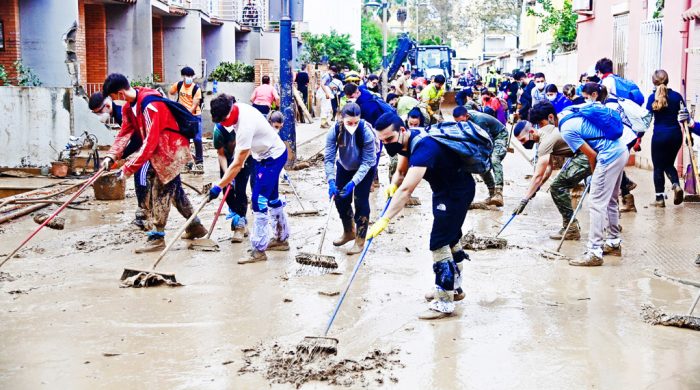Jashore florists devastated by coronavirus pandemic, cyclone

- Update Time : Wednesday, June 17, 2020
- 131 Time View

Coronavirus outbreak and subsequent cyclone Amphan have severely affected the flower farmers in Jashore who incurred loss of an estimated amount of Tk over 50 crore in the last two and a half months.
Flower growers said in the last two months, thousands of tonnes of flowers were perished as they could not sell their produces after all celebrations and outdoor events were canceled to limit the transmission of the deadly virus.
Later, cyclone Amphan brought a double blow to the floriculture in Jashore, affecting thousands of people of the area dependent on it, they said.
Since the flowers are not being sold now, frustrated farmers are now feeding flowers to their cows and goats.
Eunus Ali, a resident of Panisara village, said fields of gerbera flowers were severely damaged by Cyclone Amphan.
“Arrangements were made to sell flowers ahead of Bengali New Year Festival. But the coronavirus appeared in and changed the scenario in a dramatic way. We couldn’t sell flowers anymore,” he said adding that cyclone Amphan destroyed his flower garden later.
Jahangir Hossain, another farmer of Patuapara in Jhikargacha, said when flowers were not being sold amidst the coronavirus pandemic, Cyclone Amphan destroyed them fully.
Sources said flower cultivation began commercially in Gadkhali of Jashore district in the 80s’and now the district has the largest wholesale market of flowers in the country.
Wholesalers from different regions including Dhaka come to Gadkhali to buy flowers.
Various types of flowers are cultivated on about 6,500 hectares of land in 65 villages of Jhikargachha and Sharsha in the west of Jessore town, said farmers.
Red, blue, yellow, purple and white flowers can be seen on both sides of the road in the villages of Jhikargachha and Sharsha. Hundreds of florists from Panisara of Jhikargachha upazila visit Gadkhali market every day, they said.
Wholesalers from different parts of the country also buy flowers from there. Then the flowers spread to other parts of the country, even outside the country through wholesalers and retailers.
Different types of flowers including marigold, rose, gladiolus, tuberose, gerbera, cosmos, daisy gypsy, dalia, chrysanthemum are cultivated on hundreds of hectares of land.
Before the pandemic, the flower market of Gadkhali used to become vibrant from dawn. But that scene is different for more than two months, they said.
Abdur Rahim, president of Bangladesh Flower Society (BFS), said flowers were cultivated on around 6500 hectares of lands in Jhikargacha and Sharsha upazilas and the cultivators were expecting to rip record produces this year.
He said nine varieties of flowers are sold in Gadkhali, the largest flower market of the country. A period of four months starting from January to April is regarded as peak season for flower trading.
This year, the flower cultivators incurred huge losses due to the shutdown imposed to slow transmission of coronavirus and Cyclone Amphan that wreaked havoc on Bangladesh few weeks back, he said.
Describing the damages as huge, he sought government assistance to help the sector survive.
However, the stimulus package of Tk 5,000 crore for the agriculture sector enabled the flower cultivators get loans on an interest of 4 percent, said Abidur.
But there was no specific guideline on how the flower cultivators and traders would avail of the loan under the package, said Abdur Rahim adding, “The authorities concerned should fix the issue soon.”
Contacted, Upazila Agriculture Officer of Jhikargacha Md Masum Hossain said all the flower gardens in Gadkhali were damaged during cyclone Amphan. Besides, the farmers have to incur huge losses due to the coronavirus fallout.
“The farmers incurred an estimated loss of Tk 30 crore due to coronavirus fallout while the amount was Tk 20 crore due to cyclone Amphan,” he added.
Dr Akhtaruzzaman, deputy director of Jashore regional agriculture office, said around 300 flower cultivators were provided with Aus seeds in a bid to help them recover the losses.
Besides, food items were distributed among 500 farmers, he said, adding that more assistances are in the pipeline for the flower cultivators.

























